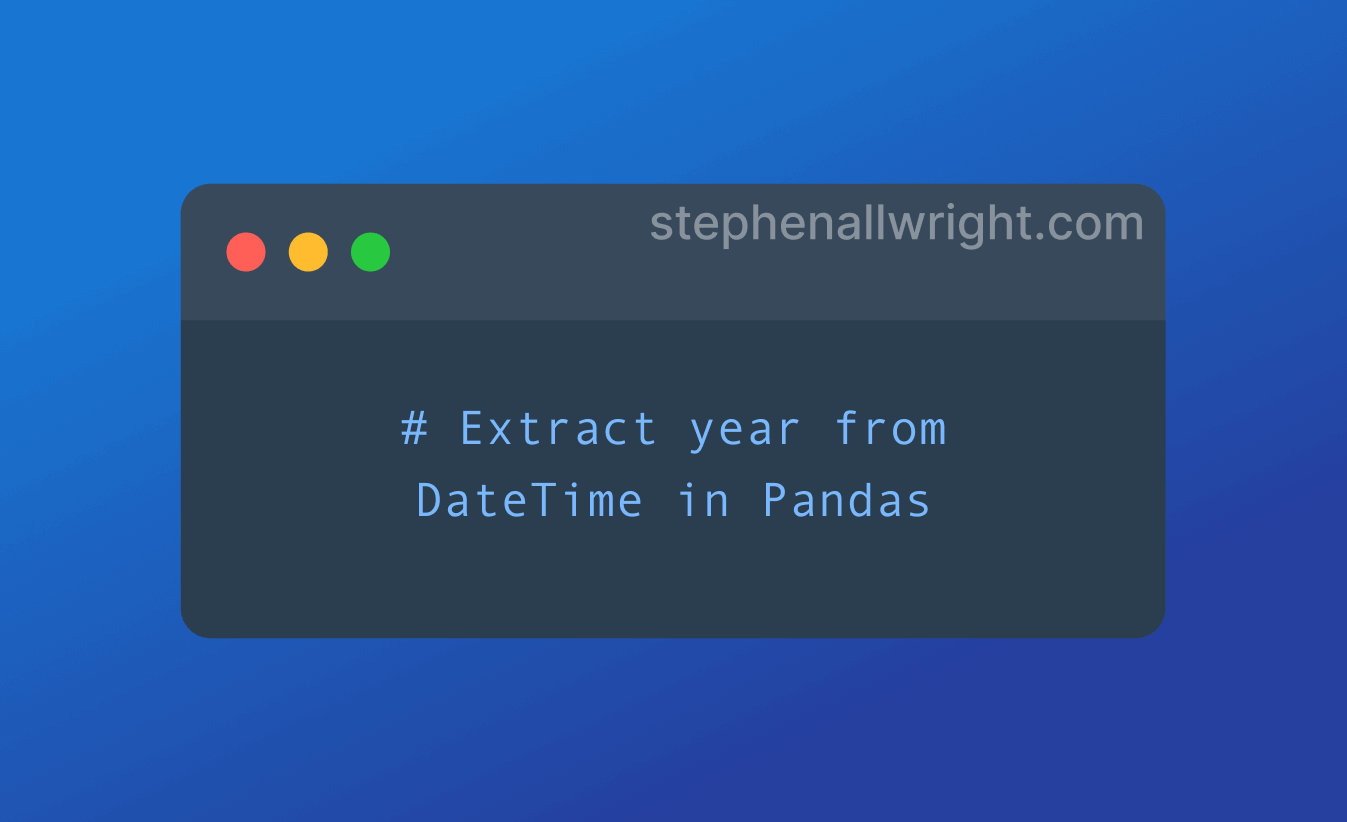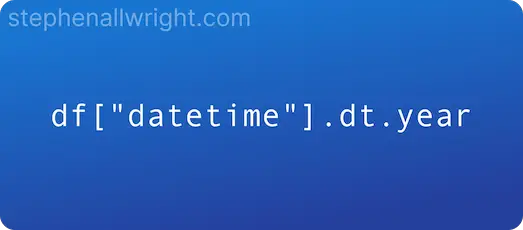
Extract year from DateTime in Pandas
Being able to extract the year from a DateTime object in Pandas can be extremely helpful for feature engineering. In this post, I will walk through how to do this simply in multiple variations.
Being able to extract the year from a DateTime object in Pandas can be extremely helpful for feature engineering. In this post, I will walk through how to do this simply in multiple variations.
How to get the year from a DateTime object in Pandas
There are several methods of getting the year from a DateTime in Pandas, which you choose will depend upon the format that you wish to return in the year in. The simplest, and also most common, way of doing this is to use .dt.year on the DateTime object which returns the year as an integer.

Extract year from DateTime in Pandas
Let’s look at an example of using the most common method of year extraction in Pandas, which is to use .dt.year. This will return the year as an integer.
import pandas as pd
df = pd.DataFrame(
columns=["datetime"],
data=pd.date_range("31/12/2022 09:00:00", periods=4, freq="Y"))
df["year"] = df["datetime"].dt.year
print(df)
print(df.dtypes)
"""
Output:
datetime year
0 2022-12-31 09:00:00 2022
1 2023-12-31 09:00:00 2023
2 2024-12-31 09:00:00 2024
3 2025-12-31 09:00:00 2025
datetime datetime64[ns]
year int64
dtype: object
"""
Extract year as a string from DateTime in Pandas
It's also possible to return the year of a DateTime as a string, instead of an integer. This is done using the strftime method in Pandas.
import pandas as pd
df = pd.DataFrame(
columns=["datetime"],
data=pd.date_range("31/12/2022 09:00:00", periods=4, freq="Y"))
df["year"] = df["datetime"].dt.strftime('%Y')
print(df)
print(df.dtypes)
"""
Output:
datetime year
0 2022-12-31 09:00:00 2022
1 2023-12-31 09:00:00 2023
2 2024-12-31 09:00:00 2024
3 2025-12-31 09:00:00 2025
datetime datetime64[ns]
year object
dtype: object
"""
Get first date of year from DateTime in Pandas
Instead of returning the year from a DateTime, you may way to round the dates to the first date of their respective years. This is possible using the tseries.offsets method from Pandas.
import pandas as pd
from pandas.tseries import offsets
df = pd.DataFrame(
columns=["datetime"],
data=pd.date_range("31/12/2022 09:00:00", periods=4, freq="Y"))
df["year_start"] = df["datetime"] - offsets.YearBegin()
print(df)
print(df.dtypes)
"""
Output:
datetime year_start
0 2022-12-31 09:00:00 2022-01-01 09:00:00
1 2023-12-31 09:00:00 2023-01-01 09:00:00
2 2024-12-31 09:00:00 2024-01-01 09:00:00
3 2025-12-31 09:00:00. 2025-01-01 09:00:00
datetime datetime64[ns]
year_start datetime64[ns]
dtype: object
"""
Get last date of year from DateTime in Pandas
Likewise, if you wanted to get the last date of the year from a DateTime in Pandas then you can use the same tseries.offsets method, just using the year-end instead of the beginning.
import pandas as pd
from pandas.tseries import offsets
df = pd.DataFrame(
columns=["datetime"],
data=pd.date_range("31/12/2022 09:00:00", periods=4, freq="Y"))
df["year_end"] = df["datetime"] - offsets.YearEnd()
print(df)
print(df.dtypes)
"""
Output
datetime year_end
0 2022-12-31 09:00:00 2021-12-31 09:00:00
1 2023-12-31 09:00:00 2022-12-31 09:00:00
2 2024-12-31 09:00:00 2023-12-31 09:00:00
3 2025-12-31 09:00:00 2024-12-31 09:00:00
datetime datetime64[ns]
year_end datetime64[ns]
dtype: object
"""
Related articles
Get year from DateTime in Python
Extract week from date in Pandas
Extract month from date in Pandas
Extract day from date in Pandas
